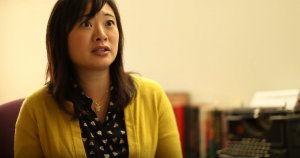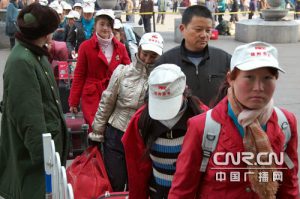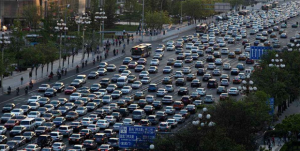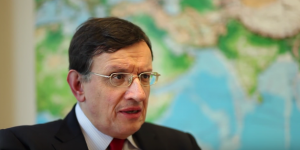China and the Global Order (Video Interview with Professor Rosemary Foot)
Chinese conceptions of global order are neither well defined nor agreed upon. Many Chinese intellectuals debate what Chinese preferences should be regarding a global order, and the future role of China within it. These scholars are putting forward new ideas often based on Confucianism or Chinese historical experience. However, this academic debate is not reflected in government statements or policy. We see no clear promotion of a coherent concept of a global order, differing from what we currently see, articulated by the Chinese government. What is clear is that China seeks more voice and more representation. Issues such as G20 membership are increasingly important to China. There may be revisions around the edges of Chinese global preferences, but China overall is not demonstrating that it is a dissatisfied power.
Journalism in China: Impacting Policy in a Changing Media Landscape (Video Interview with Melissa Chan)
Currently a John S. Knight Journalism Fellow at Stanford University, and former China correspondent for Al Jazeera, journalist Melissa Chan discusses the changing media landscape in China and the role played by foreign correspondents.
Unsettled Remains: Tensions over Unrepatriated Bodies from the Asia-Pacific War
The “remains issue” (ikotsu mondai) refers to controversies surrounding the bodily remains of Korean and Chinese nationals who died during the Asia-Pacific War in Japan and whose bodies have not yet been repatriated. Most were conscripts: soldiers, military personnel and forced labourers. After the War, the remains of Chinese forced labourers were largely repatriated to the bereaved families, but it is estimated that as many as two thousand Korean bodies may still be stored at temples and buried across the country.
Gender and Ethnic Tensions in Western China
The March 2013 sentencing of 20 Uyghur men in Xinjiang, China, on terrorism- and separatism- related charges highlights ongoing frictions in China’s far west. Amid China’s media censorship and practice of conflating some peaceful resistance or ordinary crimes with terrorist activities, full details of these events remain unknown. What is clear is the persistence of ethnic tensions, also illustrated during protests and riots in the region in 2009.
Lotteries vs. Auctions: China’s Experiments in Managing Automobile Growth
The astronomical growth in the number of private cars in China has led to very visible environmental crises and congestion. But the nationwide increase conceals crucial policy differences between cities that influence effectiveness, revenue, efficiency, equity and public acceptance. While Shanghai and Beijing each had approximately 2 million motor vehicles in 2004, by 2010 Beijing had 4.8 million versus Shanghai’s 3.1 million. By 2011, 38% of Beijing households were vehicle owners in contrast to 18% in Shanghai. Two decades ago Shanghai opted for a monthly license auction to control vehicle ownership, while Beijing had few controls over usage or ownership until the run up to the 2008 Olympics.
Overhauling China’s Organ Transplant System
At a WHO conference in 2005, China’s vice-minister of health Huang Jiefu became the first public official to admit the country’s reliance on organs from executed inmates, and promised a transition to a voluntary donation system. A pilot for such a system has established a donation network set to expand this year, fixing the disorderly arrangements that have long been criticized by international health and human rights organizations.
Reflections on Japan (Video Interview with Sir David Warren)
Recent territorial disputes point to tensions in the relationship between Japan and China. Competition extends beyond issues of history and territorial assertions to competition for resources and influence. Yet it is increasingly recognized that Japan and China are crucial to each other.
Hikikomori: Entering Middle Age
When the term “hikikomori” (引き籠もり, acute social withdrawal) was introduced by the Japanese media in the early 1990s, it referred to high school students or young adults. Government, academics and society blamed a range of social or cultural pressures that built up to breaking point (such as failing an exam). A government estimate in 2010 put the number of hikikomori at 700,000, though the actual figure may be far higher. Hikikomori are predominantly males from middle- or high-income families able to support them financially. Many of the first to withdraw over twenty years ago are now middle-aged and present Japan with a new set of social problems.
Why are Foreign Mining Companies Retreating from China?
In the 1990s, China opened up the country’s vast mineral resources to international investment. Over the past decade, it has reformulated its mining legislation to attract foreign companies into the Chinese mining sector with the hope of speeding up its modernization. Between 2001 and 2004 the number of foreign mining projects quickly increased from 150 to 279. But by 2010, this number had declined to 92. International firms continue to feel stymied by an inconsistent and convoluted mining policy and their inability to create relationships of trust with local mining stakeholders.
Otaku Marketing: Idols and Fans in Japanese Television Advertising
Memo #205 By Jason G. Karlin – ukarlin [at] mail.ecc.u-tokyo.ac.jp More than in nearly any other country, celebrity is central to Japanese television advertising. Indeed, about 70% of all Japanese commercials feature a celebrity. With as much as ¥1.7 trillion ($21.3 billion) spent on television advertising in Japan every year, celebrities—specifically idols—are the means of […]









